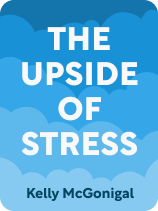

This article is an excerpt from the Shortform book guide to "The Upside of Stress" by Kelly McGonigal. Shortform has the world's best summaries and analyses of books you should be reading.
Like this article? Sign up for a free trial here.
Can stress be good for you? What are the benefits of stress?
We’re often taught that stress is harmful and best avoided, but the reality is less black-and-white and more nuanced. According to psychologist Kelly McGonigal, stress isn’t the enemy it’s typically made out to be—rather, it’s an ally we should embrace.
Keep reading to learn about the benefits of stress.
Kelly McGonigal: Stress Is Good For You
McGonigal explains that stress is paradoxically associated with happiness and meaning. For example, countries where people report more stress also have a higher GDP, more happiness, and greater satisfaction with life.
Why do we find meaning in the same places we find stress? Here’s how McGonigal explains the benefits of stress: If you pursue ambitious goals and take on significant responsibility, you’re more likely to be stressed—but you’re also more likely to be happy, find meaning in your life, and live longer. For example, you might say that your kids are your greatest source of daily stress. You want them to be safe, successful, and happy, but all of these things are uncertain and cause you to worry. However, your kids might also be your greatest source of happiness. Their silliness and love brighten your day, and caring for them gives you a sense of purpose.
| The idea that responsibility and stress lead to meaning is consistent with Rule 7 in Jordan Peterson’s 12 Rules for Life, which says you should act in ways that reduce unnecessary suffering, and push yourself beyond your comfort zone in order to live more meaningfully. Obviously, following these guidelines will often be stressful—pushing yourself beyond your comfort zone is basically another way of saying “do things that are stressful.” For example, reducing unnecessary suffering might mean putting yourself in harm’s way to protect someone or having an uncomfortable conversation with someone who could use forgiveness or support. Although this may be uncomfortable, the author contends that this philosophy leads to more learning, more satisfaction with your life, and ultimately, to a more meaningful life. |
McGonigal adds a caveat to this argument, explaining that some studies show stress is also associated with depression and mortality. For example, a study measuring the effect of stress on men’s mortality over 50 years found that men who reported the most daily hassles were far more likely to die. However, the measurement that tracked daily hassles was highly subjective: Participants were presented with a list of everyday responsibilities and were asked to rate whether they considered these things a hassle or uplifting. Those who rated daily activities as a hassle were more likely to die. McGonigal argues that because the list of everyday activities consisted of things that are inherent in daily life, this method of measurement actually demonstrated that the participants’ mindsets—that is, their perceptions or beliefs about their daily activities—determined whether daily hassles were deadly or not.
| McGonigal proposes that mindset—rather than daily hassles—made the difference in mortality in this study because participants rated the effect of inevitable, daily activities. However, the fact that the rated activities are common doesn’t imply that they posed an equal level of stress to the participants. For example, McGonigal mentions one of the daily activities was “the nature of your work,” which could mean very different things for different participants. A police officer and a barber likely won’t have the same levels of stress each day. Although the full study isn’t publicly available, a summary of the study’s recruitment methods shows that police officers and firefighters are included among participants. A report of the most stressful jobs lists police officers at number four and firefighters at number two. Thus, this daily hassle may have varied significantly in severity. |

———End of Preview———
Like what you just read? Read the rest of the world's best book summary and analysis of Kelly McGonigal's "The Upside of Stress" at Shortform.
Here's what you'll find in our full The Upside of Stress summary:
- Why stress is an ally that should be embraced
- How stress can lead to enhanced health, greater success, and a more meaningful life
- How to change your mindset about stress to receive its benefits






